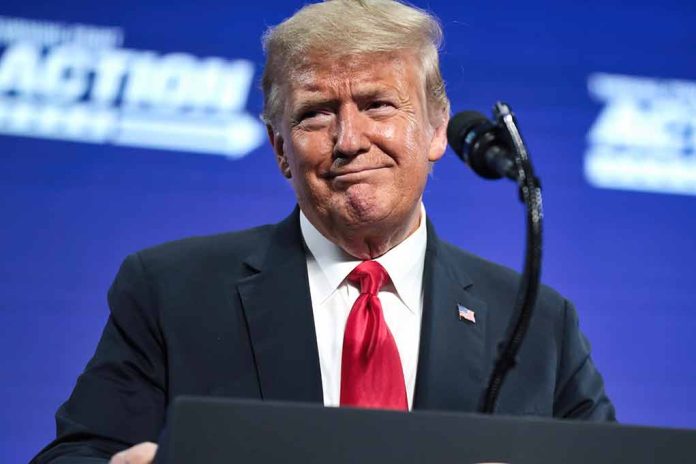
President Trump calls India’s airstrikes against Pakistani terrorist camps “a shame,” highlighting the severe tensions between nuclear-armed neighbors that threaten regional stability.
Key Takeaways
- India conducted “Operation Sindoor,” launching precision strikes on nine terrorist camps in Pakistan and Pakistan-occupied Kashmir in response to a terrorist attack that killed 26 people.
- President Trump expressed concern about the conflict, stating, “it’s a shame,” while hoping the situation “ends very quickly.”
- Pakistan has vowed to retaliate against India’s strikes at “a time of their choosing,” escalating tensions between the nuclear-armed neighbors.
- India characterized the operation as “precise and restrained,” deliberately avoiding Pakistani military facilities in what they called a “calibrated and non-escalatory approach.”
- The strikes followed India’s escalating punitive measures against Pakistan, including the suspension of water treaties and the downgrading of diplomatic ties.
Trump’s Diplomatic Concerns Over South Asian Hostilities
President Trump expressed measured concern about India’s recent military strikes in Pakistani Kashmir, characterizing the situation as “a shame” while expressing hope for a swift resolution. The President’s comments came in response to India’s “Operation Sindoor,” which targeted nine terrorist camps in Pakistan and Pakistan-occupied Kashmir. These strikes were conducted in retaliation for a deadly terrorist attack in Pahalgam, Jammu and Kashmir, that claimed 26 lives, predominantly civilians. Trump’s statements reflect the delicate balance required in maintaining relationships with both nuclear-armed nations while encouraging de-escalation.
“We just heard about it as we were walking in the doors of the Oval. I guess we knew something was going to happen based on a little bit of the past,” said Donald Trump, President of the United States.
The President’s acknowledgment of prior awareness suggests intelligence sharing between the U.S. and India regarding potential military actions. This coordination underscores the strategic importance the Trump administration places on its relationship with India, even while expressing concern about escalating regional tensions. Trump’s nuanced response indicates his administration’s desire to maintain diplomatic influence in the volatile Kashmir situation while recognizing India’s security concerns regarding cross-border terrorism emanating from Pakistan-based groups.
— Sentinel (@SentinelTeamHQ) May 5, 2025
Escalating Tensions: India’s Strategic Strikes and Pakistan’s Response
India’s military operation targeted locations with significant ties to terrorist organizations, specifically Lashkar-e-Taiba in Muridke and Jaish-e-Mohammed in Bahawalpur. Both groups have been designated as terrorist organizations by the United States and have been implicated in numerous attacks within India. The Indian government carefully framed the operation as a “precise and restrained response” that intentionally avoided Pakistani military installations. This messaging was crafted to signal that India was acting against terrorist threats rather than initiating broader military conflict, demonstrating a “calibrated and non-escalatory approach.”
Pakistan’s response has been forceful, with Prime Minister Shehbaz Sharif claiming attacks occurred in five locations and asserting Pakistan’s “right to respond forcefully.” The Pakistan Ministry of Foreign Affairs characterized India’s strikes as “an unprovoked and blatant act of war.” Pakistan’s military confirmed strikes in Bhawalpur, Kotli, and Muzaffarabad, while stating they were conducted from Indian airspace and declaring that Pakistan would respond at a time of its choosing. This threat of retaliation has heightened concerns about potential escalation between the nuclear-armed neighbors.
Broader Implications for Regional Stability and U.S. Foreign Policy
The Kashmir conflict represents one of the most enduring and volatile territorial disputes in the world, with India and Pakistan having fought multiple wars over the region since their independence from British rule in 1947. President Trump’s characterization of the conflict as spanning “many, many decades, and centuries” acknowledges the deep historical roots of these tensions. The current escalation follows India’s implementation of several punitive measures against Pakistan, including suspension of the Indus Waters Treaty, closure of the Attari land border crossing, and downgrading diplomatic ties.
President Trump’s administration faces the complex challenge of maintaining constructive relationships with both nations while encouraging peaceful resolution. India has emerged as a vital strategic partner for the United States in countering China’s growing influence in the Indo-Pacific region. At the same time, Pakistan’s cooperation remains crucial for regional security and U.S. interests in Afghanistan. The President’s comments reflect this delicate balancing act, expressing concern about the conflict while refraining from explicitly criticizing either nation’s actions. This measured approach underscores the Trump administration’s pragmatic foreign policy focused on American interests and regional stability.




